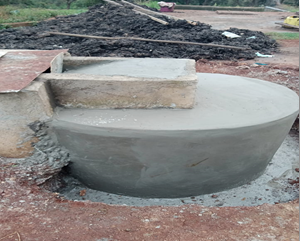Maintenance and Troubleshooting of a biogas plant is as important as its installation. It is not enough just to install a biogas plant. If anything, biogas installation is just but the very beginning of other key activities that should undertaken to ensure a stable gas production and supply.
The following should be considered as common annual fixed dome biogas plant monitoring activities to perform when biogas quantity reaching the kitchen is unstable or substantially decreasing:
Check the gas-tightness of the pipes (pressure-test)
Close the main valve (on top of the dome) and connect a gas pressure meter (0 – 160 mbar) in the kitchen ahead of the (closed) kitchen valve. Open the main valve and wait until the pressure rises up to at least 100 mbar, then close the main valve. Wait 10 minutes. If the pressure decreases by more than 5 mbar, use a soap and water solution to detect the leaks. Necessary repair work can then be undertaken to fix the leaks. Repeat the test until the pressure remains constant.
Check the gas tightness of the dome (pressure-test)
Connect the pressure gauge right after the main valve on top of the dome. If the pressure, even after several days of no gas being consumed never rises up to the maximum design pressure (i.e. the pressure at which the slurry level in the compensation chamber reaches overflow point), then the dome is probably not gas tight and needs to be checked. Leaks can be detected by applying soap water on the dome, if accessible, and then repaired.
Check blockage of inlet pipe
Another reason for low gas production is clogging of the inlet pipe. This will eventually prevent feeding substrate into the digester. Depending on the design, the inlet pipes can be unblocked either with a long plastic tube or wooden stick at the feeding point or at the inspection chambers (if available).
Check blockage of gas pipe by condensed water
Check and empty the condensate water trap.
Observe the slurry level in the compensation chamber
The level should be high in the morning as gas is produced overnight, and lower during the course of the day when gas is consumed.
Check gas-producing activity of digestate
If the pH in the digestate is neutral but it is not clear if the slurry inside the digester is still active (i.e. producing gas), the balloon test can be applied.
Control the biogas stove
The flame at the biogas stove gives some indication on the gas pressure and the combustion (Zifu et al., 2008).
Remove the accumulated sludge on the bottom of the digester
If all the above measures have been performed but the gas production is still very low, it may be that over the years the active reactor volume has decreased because of accumulated sludge on the bottom of the digester. In this case, the sludge needs to be manually removed from the bottom of the digester. The frequency of desludging depends on many parameters but typically, if properly designed and operated, sludge emptying should only be necessary at least in every 5 years
Note
In order to ensure a health biogas plant, it is important to note that a health Biogas Plant requires health feeding practices. Ensure that the plant is well fed, with right feedstock content and right proportions. Otherwise, there are many factors that can affect gas production (anaerobic digestion) in a biogas plant.
Further Reading Resources
Vögeli Y., Lohri C. R., Gallardo A., Diener S. and Zurbrügg C. (2014). Anaerobic Digestion of Biowaste in Developing Countries: Practical Information and Case Studies. Swiss Federal Institute of Aquatic Science and Technology (Eawag), Dübendorf, Switzerland.
Wanjohi, A.M. (2022). The Blue Flame: Biogas Training Blueprint. Nairobi: KENPRO Publications..
For inquiries about Biogas installation and maintenance at institutional and household levels, kindly contact Kenpro Biogas Program Team or call us +254725788400.

